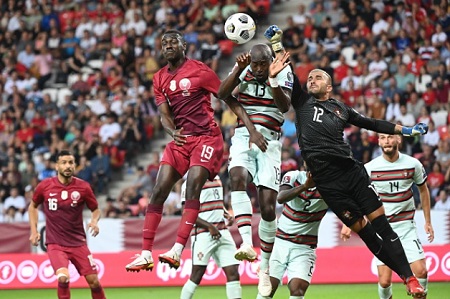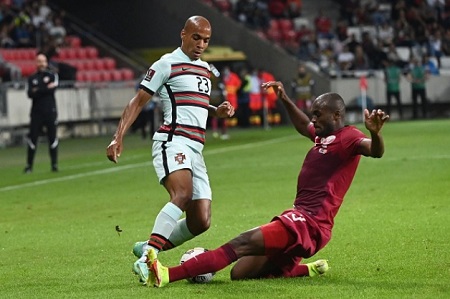 Portugal beat Qatar 3-1 in an international friendly at Nagyerdei Stadion in Debrecen. Two quick goals to André Silva and Otávio established a 2-0 lead before the World Cup hosts were reduced to 10 men on the stroke of half time.
Portugal beat Qatar 3-1 in an international friendly at Nagyerdei Stadion in Debrecen. Two quick goals to André Silva and Otávio established a 2-0 lead before the World Cup hosts were reduced to 10 men on the stroke of half time.
The Seleção failed to run away with the contest however, Abdelkarim Hassan making it 2-1 before a late Bruno Fernandes penalty sealed the deal.
Despite a poor run of form, Portugal remains a popular team to back on bet365 bonuskod and other gaming sites, gamblers convinced performances will improve given the players available to the coach. The match allowed Fernando Santos to tinker with the formation and personnel with Otávio making his debut. Danilo Pereira started at centre-back with Rúben Neves and João Moutinho running the show in midfield.
Qatar go close
Qatar created the opening chances and went close to taking the lead. Abdulaziz Hatem shot wide before Akram Afif broke clear, isolating Domingos Duarte and feeding Almoez Ali who rattled the post.
There was more to come as Boualem Khoukhi’s shot through traffic took a deflection off Danilo which forced a smart save from Anthony Lopes.
Boom boom
Portugal worked their way into the game and took the lead in the 23rd minute. João Mário’s cross deceived Abdelkarim Hassan, the ball finding André Silva who reacted well to head past Meshaal Barsham.
A minute later it was 2-0. Gonçalo Guedes’ cross saw Abdelkarim back off which allowed Otávio to sneak in and head into the top corner.
Portugal took complete control and pushed for a third goal. João Mário won possession and shot wide, André Silva’s shot was blocked with Otávio’s follow up saved before Silva blazed over the bar.
On the stroke of half time Qatar were reduced to 10 men. Guedes was fouled by Barsham, and after a VAR intervention Qatar's shot stopper was sent off as the Valencia forward would have fired into an empty net.
João Moutinho’s free kick was deflected over the bar as the teams went into half-time. Many would have expected the floodgates would open but it wasn't to be.
Second half to forget
Portugal entrenched themselves in Qatar’s half, but their deep 5-3-1 formation saw the Seleção struggle to create clear cut chances.
João Mário blazed over as Fernando Santos started to make substitutions in the 59th minute. André Silva and Moutinho made way for Diogo Jota and Bruno Fernandes with the formation morphing into a 4-3-1-2.
Two minutes late Qatar pulled a goal back. It came out of nowhere as Abdelkarim rose high and headed a corner past Anthony Lopes.
Rúben Dias and Trincão were introduced for João Mário and Rúben Neves which saw Danilo move into the holding midfield role.
Portugal’s cohesion was suffering but chances soon began to flow as Jota headed Fernandes’ cross wide, Nuno Mendes’ shot was deflected wide and Trincão’s shot failed to trouble Yousef Hassan.
Trincão won a free kick in a dangerous position from which Fernandes narrowly missed the top corner. With 10 minutes remaining Rafa Silva came on for Guedes and Raphaël Guerreiro replaced Nuno Mendes.
In the 88th minute Portugal made it 3-1 to end the contest. Bruno Fernandes released Diogo Jota who was too clever for Tarek Salman, drawing a foul in the box with Fernandes stepping up and smashing the penalty into the bottom corner.
Shades of 2016
Portugal’s midfield was very fluid in the first half with João Mário, João Moutinho and Otávio frequently rotating and proving hard for Qatar to pick up. There were similarities with the 4-4-2 formation and tactics Fernando Santos used effectively at Euro 2016.
João Mário
After playing an important role for Portugal at Euro 2016, João Mário moved from Sporting CP to Inter Milan for €40m. He continued to be an important player for Santos until the 2018 World Cup.
 Any thoughts he would go on to become one of the elite midfielders in world football quickly dissipated however, and problems at club level meant that he found himself on the outside looking in.
Any thoughts he would go on to become one of the elite midfielders in world football quickly dissipated however, and problems at club level meant that he found himself on the outside looking in.
Since the Russian campaign he has played a total of 220 minutes for Portugal, but it’s great to see him back and doing what he does best.
Mário is very effective in Santos’ system and could be an important player for the remainder of the World Cup qualifiers.
Otávio makes his mark
Otávio was slow to get going on his Portugal debut, guilty of some poor touches and passes, but scoring in the 24th minute provided the confidence to become more involved and display his class.
The Brazilian born playmaker has long been one of Porto’s best players, if not the best. His versatility, skill, attitude and work rate can only be a bonus for the Seleção.
Cross the ball
Four of Portugal’s last five goals have come from heading crosses into the back of the net.
With Cristiano Ronaldo the best in the business, André Silva an elite finisher with his head and Portugal often struggling to break down deep lying defences, it makes sense that crosses towards those target men should continue to be a legitimate part of the attacking philosophy.
Defensive issues
Against Republic of Ireland we saw Portugal’s defence susceptible to fast breaks and opposition attackers profiting from isolating Pepe.
Qatar went very close to opening the scoring from a similar situation, this time Akram Afif isolating Domingos Duarte which resulted in Almoez Ali hitting the post. It's something Santos needs to fix as elite nations will surely be more ruthless.
Both of the goals conceded this week came from corners, another problem Portugal need to address.
Line Up
Portugal XI (4-4-2): Anthony Lopes - Nuno Mendes (Raphaël Guerreiro 81’), Domingos Duarte, Danilo Pereira, Nélson Semedo - João Mário (Trincão 68’), Rúben Neves (Rúben Dias 68’), João Moutinho (Bruno Fernandes 59’), Otávio - Gonçalo Guedes (Rafa Silva 81’), André Silva (Diogo Jota 59’)
Unused substitutes: Rui Patrício, Diogo Costa, Pepe, João Cancelo, João Palhinha, Bernardo Silva
Coach: Fernando Santos
Goals:
[1-0] - André Silva 23'
[2-0] - Otávio 24'
[2-1] - Abdelkarim Hassan 61'
[3-1] - Bruno Fernandes 88' P